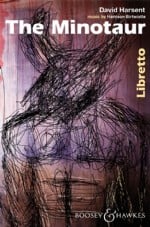Birtwistle, Harrison - Minotaur (Libretto by David Harsent)
Words by David Harsent, music by Harrison Birtwistle.
The gods look down and laugh...
David Harsent's retelling of the myth of the Cretan Minotaur has a powerful slant: it considers the inner world of the Minotaur himself, and suggests a dark and compelling reason for Ariadne's intense relationship with Theseus.
The Minotaur, imprisoned in the labyrinth, inhabits a narrow, pitiless world. He does not fully comprehend the duality of his physical nature as half-bull, half-man; only in sleep and, ultimately, in death does his human side become evident. Ariadne, too, is conscious of being imprisoned: she logs to escape from Crete, a place that serves only to remind her of an unbearable personal history in which her father's hubris has been the cause of her mother's sin against nature and the resultant birth of her monstrous half-brother.
Ariadne hopes that, with the help of the Oracle, she will enable Theseus to find a way out of the labyrinth should he survive his encounter the Minotaur. She believes this will give her power over Theseus and persuade him to take her back with him to Athens. Both she and Theseus see the Minotaur as scapegoat and deliverance. In this cat's-cradle of deviousness, cruelty, loss and betrayal, none is innocent, though none is wholly to blame. Harsent's haunting version brings an original interpretation to this well-known story.
Press Reviews
The music's crazy momentum - dominated by bass clarinets, lower brass, and thunderous percussion - displays Birtwistle's talents at magnificently full stretch. . . . This is the most powerful and original opera yet to have emerged this century.
The Scotsman
Harrison Birtwistle defies easy categorisation. As one of the few musicians who change the way we listen, he stands comparison with Beethoven and Wagner. He is certainly the most original composer at work in Britain today, perhaps anywhere on earth. If you don't believe me, go to The Minotaur.
Norman Lebrecht, Evening Standard

